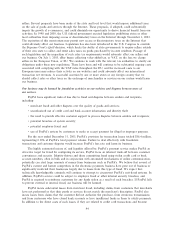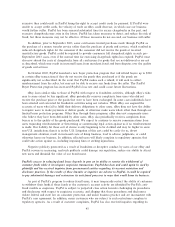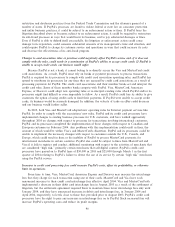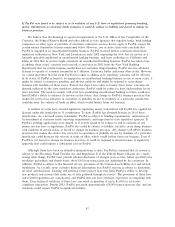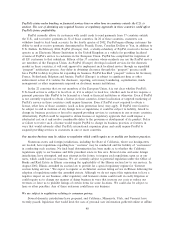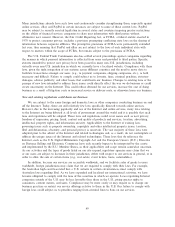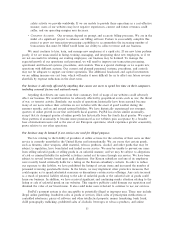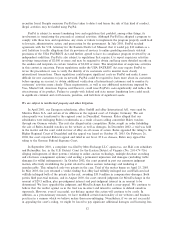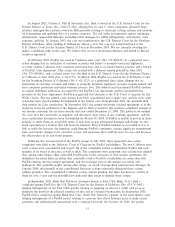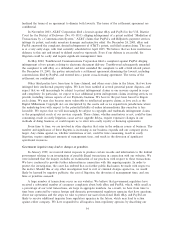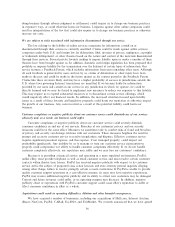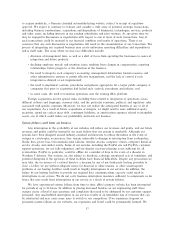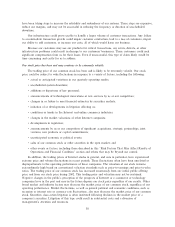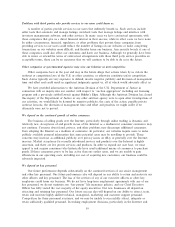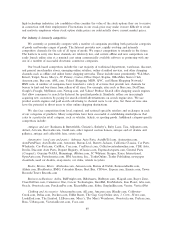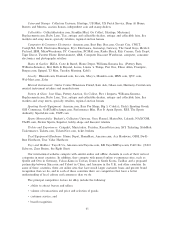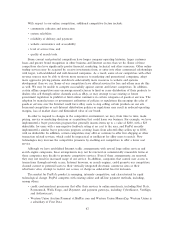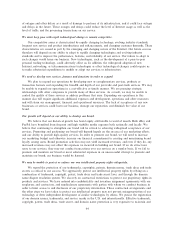eBay 2003 Annual Report Download - page 56
Download and view the complete annual report
Please find page 56 of the 2003 eBay annual report below. You can navigate through the pages in the report by either clicking on the pages listed below, or by using the keyword search tool below to find specific information within the annual report.Ñnalized the terms of an agreement to dismiss both lawsuits. The terms of the settlement agreement are
conÑdential.
In November 2003, AT&T Corporation Ñled a lawsuit against eBay and PayPal in the U.S. District
Court for the District of Delaware (No. 03-1051) alleging infringement of a patent entitled ""Mediation of
Transactions by a Communication System.'' AT&T claims that PayPal's and Billpoint's payment services
infringe its patent, and seeks monetary damages and injunctive relief. On December 24, 2003, eBay and
PayPal answered the complaint, denied infringement of AT&T's patent, and Ñled counterclaims. The case
is at a very early stage, with trial currently scheduled for April 2005. We believe that we have meritorious
defenses to this suit and intend to defend ourselves vigorously. Even if our defense is successful, the
litigation could be costly and require signiÑcant management time.
In May 2002, Tumbleweed Communications Corporation Ñled a complaint against PayPal alleging
infringement of two patents relating to electronic document delivery. Tumbleweed subsequently amended
the complaint to add eBay as a defendant, and later amended the complaint to add a third related patent.
On December 19, 2003, the parties entered into a settlement agreement dismissing the lawsuit, including
counterclaims Ñled by PayPal, and entered into a patent cross-licensing agreement. The terms of the
settlement are conÑdential.
Other third parties have from time to time claimed, and others may claim in the future, that we have
infringed their intellectual property rights. We have been notiÑed of several potential patent disputes, and
expect that we will increasingly be subject to patent infringement claims as our services expand in scope
and complexity. In particular, we expect to face additional patent infringement claims involving services we
provide, including various aspects of our Payments business. We have in the past been forced to litigate
such claims. We may also become more vulnerable to intellectual property claims as laws such as the
Digital Millennium Copyright Act are interpreted by the courts and as we expand into jurisdictions where
the underlying laws with respect to the potential liability of online intermediaries like ourselves is less
favorable. We expect that we will increasingly be subject to copyright and trademark infringement claims
as the geographical reach of our services expands. These claims, whether meritorious or not, could be time
consuming, result in costly litigation, cause service upgrade delays, require expensive changes in our
methods of doing business, or could require us to enter into costly royalty or licensing agreements.
From time to time, we are involved in other disputes that arise in the ordinary course of business. The
number and signiÑcance of these disputes is increasing as our business expands and our company grows
larger. Any claims against us, whether meritorious or not, could be time consuming, result in costly
litigation, require signiÑcant amounts of management time, and result in the diversion of signiÑcant
operational resources.
Government inquiries may lead to charges or penalties.
In January 1999, we received initial requests to produce certain records and information to the federal
government relating to an investigation of possible illegal transactions in connection with our websites. We
were informed that the inquiry includes an examination of our practices with respect to these transactions.
We have continued to provide further information in connection with this ongoing inquiry. In order to
protect the investigation, the court has ordered that no further public disclosures be made with respect to
the matter. Should this or any other investigation lead to civil or criminal charges against us, we would
likely be harmed by negative publicity, the cost of litigation, the diversion of management time, and any
Ñnes or penalties assessed.
A large number of transactions occur on our websites. We believe that government regulators have
received a substantial number of consumer complaints about both eBay and PayPal, which, while small as
a percentage of our total transactions, are large in aggregate numbers. As a result, we have from time to
time been contacted by various foreign and domestic governmental regulatory agencies that have questions
about our operations and the steps we take to protect our users from fraud. Both eBay and PayPal are
likely to receive additional inquiries from regulatory agencies in the future, which may lead to action
against either company. We have responded to all inquiries from regulatory agencies by describing our
54


